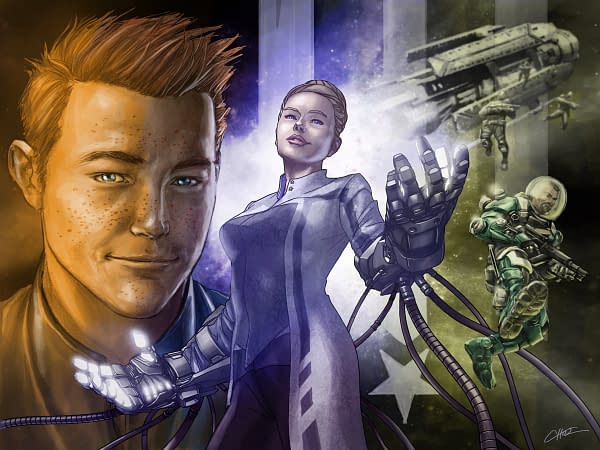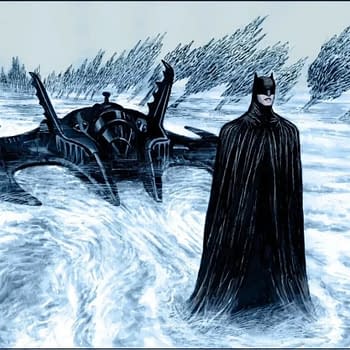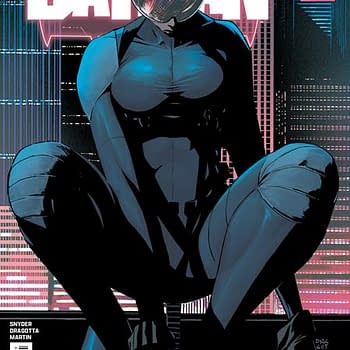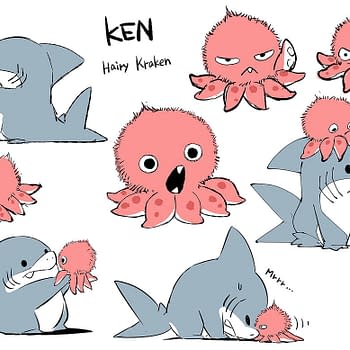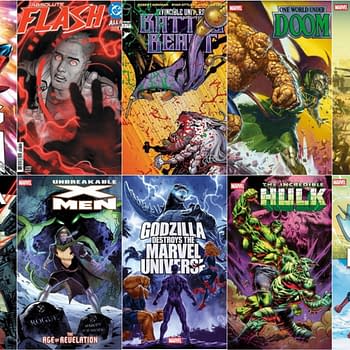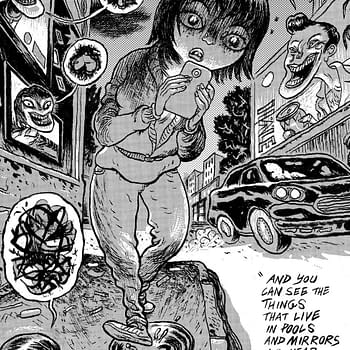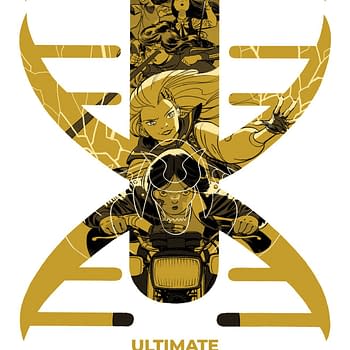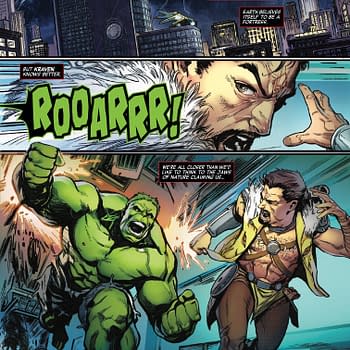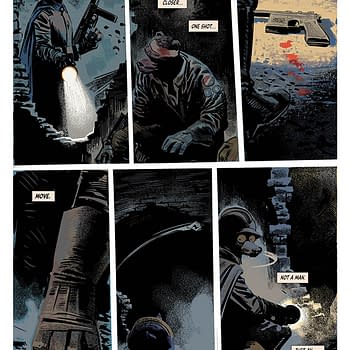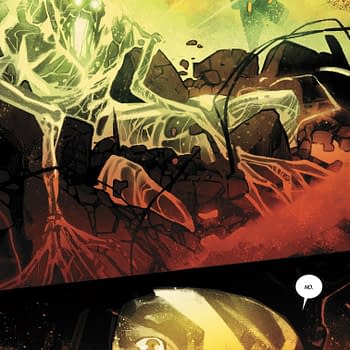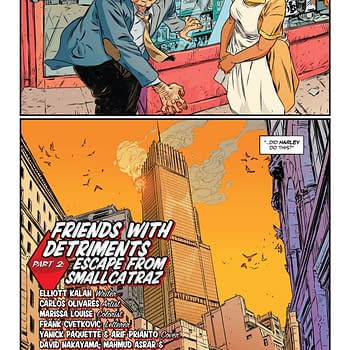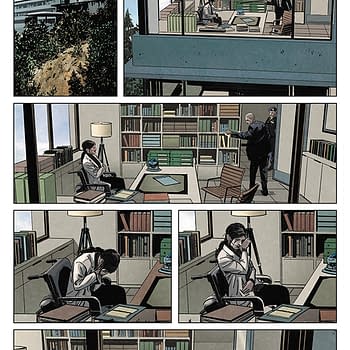Posted in: Comics | Tagged:
Choi Division – Alex Wilson Talks To Michael Choi
Alex Wilson writes;
Michael Choi is a comic book artist who has worked for DC, Marvel, and Top Cow. I had a chance to talk with him about what he is currently working on, how the transition from comic book art to video game concept art has been, and his advice for artists trying to break into the comic book industry along with much more.
If you want to keep up with what Choi is doing, follow him on Twitter @MikeHChoi or find him on facebook at facebook.com/mikechoiart.
You have worked with many companies (Top Cow, Marvel, DC.) Is
there a company you prefer working for? Why?
Each company has its positives and negatives in terms of how I felt I
fit there, but I definitely think I was lucky to have been at each
company when I was there, in terms of how each impacted my growth as a
comic creator.
For example, I'm only here because I was lucky to have had the
opportunity to work in a studio environment at Top Cow, and learn
under the direct tutelage of established artists like Marc Silvestri,
Dave Finch, Joe Benitez, and Billy Tan, alongside
already-up-and-comers like Francis Manapul, Tyler Kirkham and Eric
Basaldua. Top Cow was also the company that not only gave me a shot at
my own book, but a shot at helping to redefine their flagship book,
Witchblade, with Ron Marz. I honestly thought that had I not been
working and growing as an artist for almost two years as an unpaid
intern, under their roof and in front of their faces, the editors
would never have given me that chance, and justifiably so. I'll always
consider myself a Top Cow guy, and Top Cow as my home of sorts in many
ways, as I'm sure would the guys I mentioned previously.
If I owe Top Cow for giving me my start, then I owe Axel Alonso for
largely making it what it became. It was a phone call from him that
convinced me that it was a good idea during a packaging deal between
Marvel and Top Cow to work on a book starring the female clone of
Wolverine, which, at the time having never read an X-23 book, sounded
kind of awful. However, after talking to Axel and reading the script
of the first issue, I fell in love with the character and the story,
and after Target X and subsequently a couple issues of X-Men and
Uncanny X-Men, I signed an exclusive contract with Marvel after my Top
Cow contract expired. I loved my time there, and would love more time
there in the future. They gave me so many opportunities to be a part
of some great stories, and I'm such a huge fan of their characters.
I guess my time with DC was comparatively short, but the first of two
things I appreciated most was that I've never had editors who
responded so positively to my request for advice on how I could make
covers and pages better, especially at the possible detriment to
timeliness. Most of the time the craft-related aspects of mainstream
comic making has to take a back seat to its commerce-related aspects,
so you have to consider yourself lucky any time an experienced editor
or art director encourages and advises you on how to improve future
work at the risk of slowing down current work. The second is that they
let me color my own work, which as someone who was just starting to
learn to color was a huge risk for them, and honestly looking back,
sucked big ones for them. My coloring was awful on my covers and the
pages I did for DC. I feel like I have improved greatly since, just
working on it every day, but I will always be grateful that they took
the chance on my coloring when I was just starting to learn how to use
Photoshop, and now I feel like I owe them for failing that aspect of
the work I did for them so miserably.
As to whom I'd prefer to work for now if I wasn't working on my own
books, as I said, each company has its pros and cons. Top Cow is a
small company that prides itself on making good books, so I'd feel
like I could approach the head honchos directly and negotiate what I'd
like to work on, and also have some say in the direction of where I'd
like to take characters and for how long. Plus I know everyone there
and trust them, which is huge. I loved working with DC, but
nevertheless feel like I could contribute so much more the next time I
work on their books. By sucking less, for one thing. Plus, I play flag
football with the DC guys from the local Burbank office which is
walking distance from where I live, not to mention their royalties
program is the best in the industry, I'm pretty sure. By far, if I'm
not mistaken, just from my limited time with them.
But in the end, I love Marvel's characters the most. And that counts
for the most, I think.
Did you grow up wanting to work on comic books or was
there another career you had in mind?
I grew up wanting to be a briefcase-carrying businessman like my dad,
actually. I went to business school at The University of Texas in
Austin, and graduated with a degree in Management Information Systems
(by the way, DC cover artist Alex Garner and Marvel artist Dave
Marquez also graduated from UT with similar unrelated-to-art degrees
too, unless I'm mistaken.) I worked at IBM as an Information
Technology Management Consultant. It was a good job, with good money,
especially right out of college. I never had any art school
experience, nor had taken any art classes, not since middle school,
anyway.
I didn't really get into comics until college, where I fell in love
with that world hard, and after getting a real job with real money,
would spend hundreds of dollars every Wednesday acquainting myself to
comics and their respective universes. I just devoured Daredevil,
Watchmen, Earth X, Rising Stars, Preacher, Sandman, the list goes on
and on. I currently have over two thousand trade paperbacks, most of
which were accumulated during that time.
I quit IBM ten years ago this past Valentine's Day after working there
for three years. I realized that I didn't love my job but I did love
comics, and started an unpaid internship at Top Cow two days later.
You have done interior and cover work. Do you prefer
one more than the other? Why?
I prefer doing interiors by a wide margin. I love the sequential
storytelling medium, and while cover work does avail itself to its own
form of unique graphical storytelling, I just love the challenge of
telling a story over twenty-two pages of sequential panels. Plus, the
return on the time spent financially is much greater just from a base
rate and royalties standpoint. It's to the point where I honestly
don't know how someone could make a living exclusively as a cover
artist, even as a guy who at one time had four monthly covers. And I'm
not even sure I've seen a single penny in royalties from those covers.
However, I do wish I'd taken fuller advantage of my time as a regular
cover artist. I had the chance to make a mark as the cover artist on
pretty big titles like Fantastic Four and FF, not to mention fun books
like Demon Knights and Captain Atom, that really could have been
exciting playgrounds to try new things. Recently I've been trying to
come up with new ways to approach drawing a single image. Not just
from a technique or draftsmanship standpoint, but also from a
emotion-generating standpoint, more than simply in terms of
storytelling. I think the problem is that I've always approached
working on a cover as simply the first panel of a bunch of panels of a
comic book, and that's just wrong. Covers need to SAY something more
than just conveying bits of a story. They have to make you FEEL
something, even if it's simply a feeling of "oooh… pretty…" It's the
only way you're going to push a person to pick up a book on the shelf,
or more accurately, convince a retailer to order it from the Previews
catalog. Otherwise you're just doing little more than the solicitation
blurb, and pictures really do have the potential of a thousand words
that I've just been squandering. It's only in hindsight that I'm
realizing how much I've been doing it wrong!
How has the transition from comic art to video game
concept art been? Any challenges? Do you play video games?
Right now I'm the lead concept designer and artist at Industrial Toys.
We're working on our first game right now, which is called Morning
Star, a first-person shooter game designed exclusively
for mobile devices. Our company is headed by Alex Seropian, who
founded Bungie, and our game designers were high-level muckety-mucks
on the Halo games from Halo 1 to ODST, so we know what we're doing. Or
at least they do. To be completely honest, I don't really play video
games. I'm obsessed with Ruzzle at the moment, but I'm not sure that
counts in this context. I do enjoy playing console game from time to
time, and feel like I do appreciate them as an art form (I've played
Dante's Inferno twice straight through just because I think it's so
well designed,) but I think I've conditioned myself to not like them
because they're just so time-consuming and I've always had pages to
draw!
The only reason I showed up to the meeting with Alex and the founders
of Industrial Toys to discuss possibly contracting me to do some
concept work was because my wife loves video games and is a huge fan
of the Halo franchise (she even wrote a college paper on the Halo
universe.) But after a forty-minute meal with these guys, I was sold.
It wasn't necessarily even the work in and of itself, but more that
these guys were really spirited and believed in what they were doing,
were aspiring to do some really cool stuff that even I could recognise
as a game-changer in the video game medium, and had the experience and
background to pull it off. So I signed up for a three-month contract,
along with Philip Tan, whom I'd known before from meeting at
conventions.
After the three months they asked me to take on a full-time position
as the lead concept artist, and I said yes. Not only did I enjoy the
work and the people in the company, I just felt like it was a good
time to make that shift from a professional standpoint. I'll always
consider myself a comic book guy, but taking the three months off I
surprisingly found myself not missing it that much. Of course I missed
the opportunity to draw my favorite characters and see them get
published, but at least during those three months, it was a huge
relief being able to go home at 7 o'clock in the evening and simply
clock out, and start fresh the next day with new ideas and
inspirations. Sure, there would be deadlines and milestones we'd have
to hit, but it wasn't close to the regular monthly grind of comics
where everything is due yesterday, and you have to eat, sleep and
breathe comics 24/7. During those three months as an outsider, it
became so obvious reading other comic book creators tweeting about how
they were going on their 30th hour without sleep to meet a Friday
deadline, or working through the weekend every week, that that just
wasn't healthy, but it was all I'd known for years. Actually having
nights and weekends where I can do my own thing and spend time with my
wife on a regular basis is something I learned was actually normal for
most people. Plus the fact that I was able to explore the possibility
of doing my own comic book stories, which was something I'd never had
time to do before, was a huge factor in signing on full-time with
Industrial Toys.
But there is that constant nagging itch that I'll eventually need to
scratch, which is to draw my favorite characters in stories written by
awesome writers, and bring a smile to the faces of the fans of those
characters, like I get when I read my favorite Marvel and DC stories.
Even if it means sacrificing sleep and time with my wife. But that's
okay, she'll be playing the new Bioshock, anyway. Whatever that is.
Was concept art something you wanted to do for a long
time or was it something that just came about? Do you hope to do more
video came concept are in the future?
I always found that there wasn't a lot of room to design the looks of
characters that had been established years prior by better minds than
mine, and felt like that would be a lot of fun. And designing the
looks of all the characters in Morning Star, not just heroes and
villains, but entire species, cultures and civilizations has indeed
been a lot of fun. But in hindsight I think that's yet another aspect
I'd gone about all wrong doing during my time in mainstream comics. I
think having the template, so to speak, of the established characters
kind of blinds an artist to all the ways they can nevertheless inject
their own personalities into the deeper visual traits of the
characters. I didn't have to draw Wolverine like a cross between Jim
Lee's rendition and Hugh Jackman. I could have done studies in terms
of how I thought MY version of Wolverine might stand, or drink a beer,
or my biggest regret, what he'd wear when he wasn't in costume. It
seems obvious now, but I just didn't get it at the time. Thinking back
to all the times I had to depict characters in civilian clothes, I
have to slap myself in the forehead over how many times I just put
them in jeans and a T-shirt. After having my eyes opened to the world
of fashion after visiting the Alexander McQueen Savage Beauty exhibit
at The Met, I've been seeing the world in a new light where I'm
actually noticing what people wear and why it makes them attractive or
not attractive. I've been devouring everything from couture look books
to magazines like Style Watch just to keep up. When I think of all the
times I put Sara Pezzini in a belly shirt and low-rise jeans, I
cringe.
I grew to really like concepting and think I'm getting better and
better at identifying and honing the very specific skillsets of video
game design, and getting used to the visual vernacular of the medium.
As I get better I'm definitely looking forward to what I can bring to
the table for our next game, and already have some ideas. There's a
real challenge to having to come up with something that is familiar to
people and yet is something that they've never seen before, and that
Venn-diagram overlap can be very thin sometimes. But it's definitely a
lot of fun, and as the full-time lead concept guy at the company, I'm
going to be a part of it no matter what, and I'm excited about it.
What are you reading in out of comic books?
It's weird. I read comics every day, but I'm not reading anything
that's on the stands right now. What I am reading on a daily basis are
books that have been on my shelf for a while, either books I've read
many times, or am reading for the first time because I'd never gotten
around to it. Like 100 Bullets is something I can always pick up and
get engrossed in, no matter how many times I've read it. After that I
might read a book like Spaceman, also by Brian Azzarello and Eduardo
Risso, which I only read for the first time last week or so (and
immediately had to reread.) Right now I'm reading Milligan and
Allred's X-Statix, and rereading and catching up on every Ed
Brubaker/Sean Phillips collaboration available. My favorite is still
probably Sleeper, although I love them all.
I could say that it's to immerse myself in awesome comics to try and
learn from them through osmosis and transfer those lessons towards my
own comics, but I'd be lying. I read them because they're awesome and
fun to read, and I like things that are awesome and fun. I think
nothing quite captures how fortunate I am like the fact that when I'm
having a hard time creating comic books and need a break, I pick up a
comic book and read it.
Do you have any feelings about the New 52? Good? Bad?
I haven't read any, other than the ones I've had to do covers for (I
highly recommend Paul Cornell's run on Demon Knights,) simply because
I feel so lost. And even though it might sound like I'm missing the
point of the New 52, I've totally fallen victim to the conditioning
over the years to think that as a comic book reader, you have to have
so much prior knowledge of stuff to fully appreciate it. Like comic
books have become an entertainment medium made up solely of easter
eggs. Of course that's not the case, but I do feel like it sometimes.
So even though I could have been reading Action Comics from issue #1
of the New 52, I nevertheless feel like I should save it for after I
read up on Infinite Crisis and so on. I didn't read a lot of
mainstream DC books during my time acquainting myself to comics,
although DC books in general, including Vertigo and Wildstorm, made up
the majority of the books I read during this time. For instance, I
honestly can't name you more than one or two Flashes or Green
Lanterns, I just know that there are several, and that in and of
itself is a barrier to entry for me.
It's not that I don't think I could appreciate it and get a cohesive
story, but I've conditioned myself to want the full experience. I
don't think I'm the only one who feels like this either. And it's not
just the New 52. I feel the same way about Marvel books, like with
everything happening with the X-Men and The Avengers. I haven't read
Schism yet, or Avengers vs. X-Men, or know why Cable's back when I
clearly saw him die (because I drew him dying.) I really do want to
know, but the mountain of homework, or as I used to call it in
college, "study debt" is getting more and more daunting. But as a
fanboy, I know that eventually I will catch up after chipping away at
the history by reading a storyline or a mini-series here and there,
and then just filling in the gaps. Or just giving up and starting
fresh with the next line of relaunches. Bottom line is that my
reluctance to being left out of what I'm sure are some really awesome
stories outweighs not getting everything, it's just a matter of when I
decide to do it, or more likely when I'm going to be able to afford
to, both time and money-wise.
What advice do you have for young artists and creators
trying to break into the industry?
Try to draw for fun every day. That's not just for people trying to
break in either. I've always said that it's so much harder to stay in
the industry than it is to break in, and the reasons are the same. The
competition will always be fierce, and you have to fight for a job
every day. And that can get exhausting. So it's important to try and
constantly remind yourself that drawing is FUN, and comics are FUN.
Something I really had a lot of fun doing while it lasted was being a
part of a collective with David Lafuente, Ryan Ottley, James Harren,
Jorge Munoz and Colleen Coover called The Sindiecate, where we'd
decide on an independent comic book every week to read and celebrate
it by drawing something inspired from that book. It was sort of a book
club/drawing club, combining the best of both. It was a lot of fun,
and very inspiring, but most of all it made us read some really great
books that we otherwise wouldn't have read.
Also, get connected to the people that make up the industry. This
really is a teaching community, and really talented and kick-ass
creators and editors will go out of their way to share insights, tips,
and processes on how they create. I can't think of anything like it
(except possibly the culinary industry,) given that most industries
would probably rather keep effective practices secret to maintain a
competitive edge. Perhaps it's because we're fans of the industry
first, so we'd rather do our best to raise all ships and make the
industry and the craft as a whole better so we can enjoy its fruits as
individuals. Or maybe it's a brothers-and-sisters-in-arms things, and
we feel like we're in this thing together, given that this "thing" of
making comics can get really hard and exhausting sometimes. So we help
each other to help ourselves, so to speak. Anyway, if you're aspiring
to break in, take advantage of it, there's no excuse not to.
By the way, I was 25 when I decided to become a comic book artist, so
I suppose young is just a better of perspective. Just do it. You're
young enough, no matter what the years say.
What are going to work on next? Any original projects?
In terms of what I'm doing with Industrial Toys, I'm really excited
about the project I'm working on with science-fiction writer John
Scalzi for the extension of our universe for Morning Star. We're
telling the story of the game in a bunch of different ways, but John
and I are creating a graphic-novel/sequential-storytelling experience
as part of that which will be a separate app from the game. We're
calling it Morning Star Alpha. It's not just going to be a
motion-comic or something gimmicky that we're tacking onto the game as
a peripheral option, because honestly, if that was the case, I'd
rather be doing a comic book for Marvel or DC. We're doing some
interesting things with this experiment by trying to take sequential
storytelling's creative and enjoyment processes to the next level
using the mechanics available to us without the restrictions of a
paper default, to coin a phrase, and also making it so that no two
reads of the story are the same. You'll have some choices to make in
the app that not only affect the overall story, but also get saved to
your account and affect the game itself when it releases a month or so
later. Conversely, the game will actually feed the enjoyment of the
Alpha app as it progresses, in that content will be revealed in Alpha
as you discover certain things in the game. So they're definitely tied
together organically to make a complete entertainment experience.
There will be different ways to explore the story, characters and
history over time. To be completely honest, as I alluded to before, I
wouldn't be all that interested in just a video game for video game's
sake. We're making a complete story with so many different facets told
via myriad media, including sequential storytelling and video games,
and that's the most exciting part to me. I wouldn't be doing any of
this if I wasn't so excited to be a part of this attempt to do
something no one's ever done before so organically and completely from
the get-go.
That's my day job. At night and on weekends I'm working on my own
original books, Carol From Accounting and Communion, which I'm hoping
to release in seven- to ten-page chapters every couple months online.
The scripts for each story are mostly finished except for gaps in the
dialogue here and there. It's just a matter of finding the time to
draw the pages, which is pretty much confined to the weekends at this
point, where I force myself to hit certain deadlines. Mostly though,
I'm working on just improving as an artist. Now that I have a day job
paying the bills where I get to utilize my creative juices, I spend
most of my remaining time just trying to get better and trying new
things. As much as I love drawing my own characters and stories, I
still find myself gravitating towards the characters I'm a huge fan
of, so I often find myself drawing an X-Man or Batman villain and
using it as a canvas to work on my coloring and painting skills. I
find that remarkably rewarding actually, because I can almost quantify
my progress by identifying things I wouldn't have done or even tried
before, because I almost don't care about the finished piece, since no
one's paying me for it, or I don't "owe" it to anybody.
But I have to admit that I am itching to do a Super- or X-book
sometime down the road. I really can't help it. It's the fanboy in me
who truly gets a kick from the privilege to add to the mythos that I'm
a fan of, and I'll never be able to completely suppress that, nor do I
want to.


